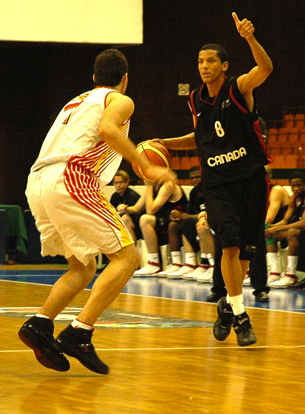Excited to be getting back into the lab after having spent the last day and a half in Futog, Serbia, attending a FIBA coaching clinic. The sessions were FANTASTIC with some wonderful new coaching ideas. Some of the coaches leading sessions included: the head coach from Panathinaikos Athens (Željko Obradović), the Australian U19 head coach (Martin Clarke) and head coach of the Australian Institute of Sport, the U20 Serbian head coach (Vlada Vukoičić), the U19 USA Basketball head coach (Jerry Wainwright), the U19 head coach of France, among others.

Too many ideas to share in this short time as I’m about to head back to Shens Arena in Novi Sad to watch our beloved Canadian team take on China at the men’s U19 FIBA World Championships.
Yesterday, our U19 Canadian men’s team beat Argentina – for the first time – which is a reflection of the progress the coaching staff and players have made. Unfortunately, due to a loss by Turkey our guys were bumped out based on a point spread.
You know, it was really interesting to see that our guys struggled with understanding how it was that we could beat an opponent and yet still not advanced, while the team they bead did. My assumption is that: (a) our kids are used to playing in win-and-go-on type tournaments, and (b) the significance of each game and each point within each game fell of deaf ears.
Every second of every game counts in international basketball—especially in a world championships. Five games in five days, is a grind!
The sheer intensity, concentration, physical endurance and mental resiliency that is required to compete at this level was obvious. All of which are trainable skills, I believe.
Good Is The Enemy Of Great
We have good basketball players in Canada, but not great ones – compared, I should say, to the rest of the top countries in the basketball world.
Our kids have good skills that have been developed; however, those same skills have been honed in an environment (i.e. no shot clock, lower overall level of competition, meaningless game, etc.) where mental habits have been formed stunting their long-term development on an international stage.
So good has become the enemy of great.
You can see that our kids have not faced enough late shot clock scenarios – at speed – to be able perform optimally under these conditions on the world stage.
Think about it… in much of Canada, and as I’ve recently learned, US high school basketball, end of clock scenarios come up four times a game at end of quarters. Whereas, the international athlete has faced thousands of such instances having grown up with a 24-second clock. The shot clock makes a BIG DIFFERENCE.
If, and this is a BIG IF, we want our basketball players to be great – not to mention play semi or professional ball internationally – we must get them playing, in their development years, with a shot clock. We must modify how we teach in practice sessions using a clock. And, we must make decision training a “fundamental” skill.
If, that is, we want our kids to be great.
Coach creatively.
/sef.